外研版九上英语Module 2 Public holidays Unit 3 Language in use. 课件(共30张PPT)
文档属性
| 名称 | 外研版九上英语Module 2 Public holidays Unit 3 Language in use. 课件(共30张PPT) |
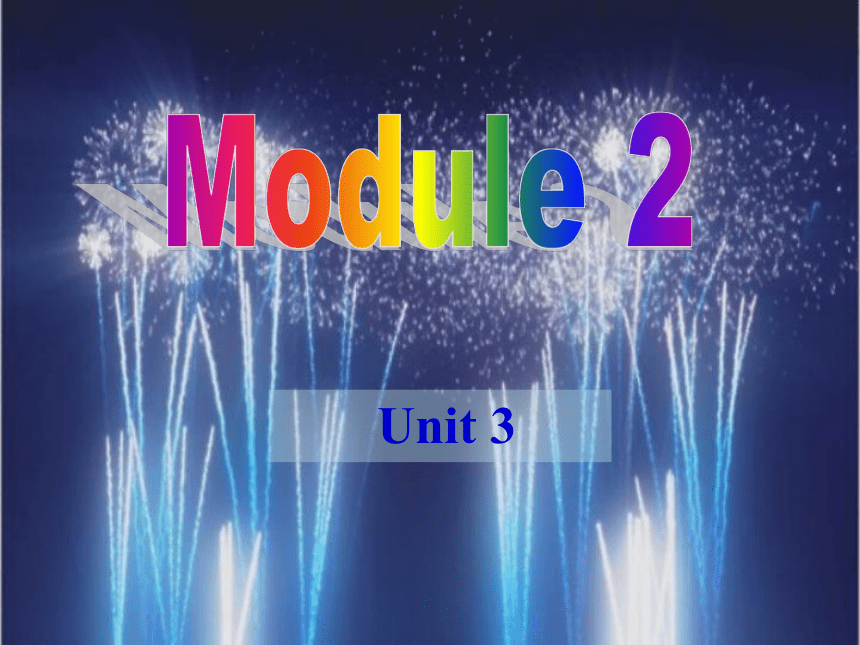
|
|
| 格式 | ppt | ||
| 文件大小 | 803.5KB | ||
| 资源类型 | 教案 | ||
| 版本资源 | 外研版 | ||
| 科目 | 英语 | ||
| 更新时间 | 2022-09-09 00:00:00 | ||
图片预览

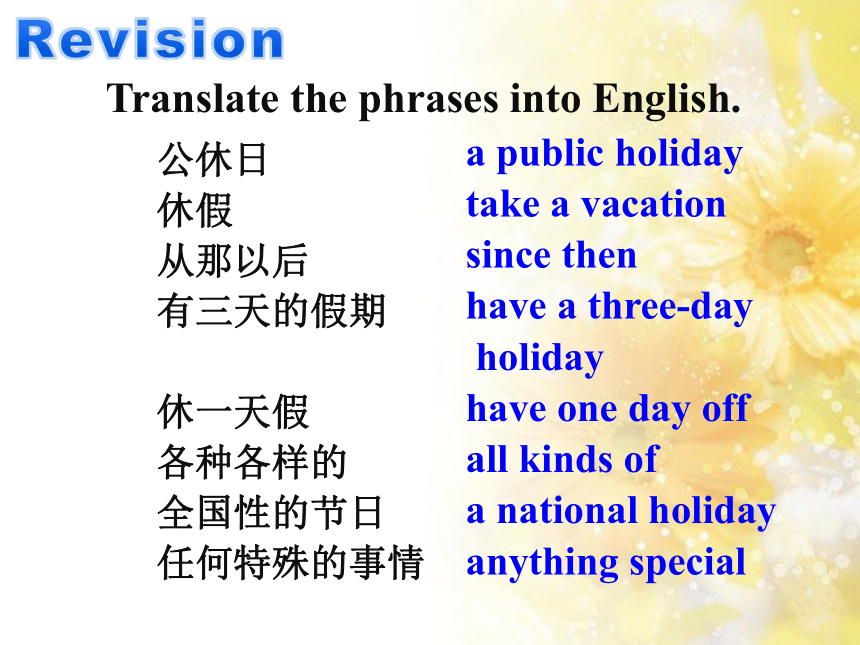
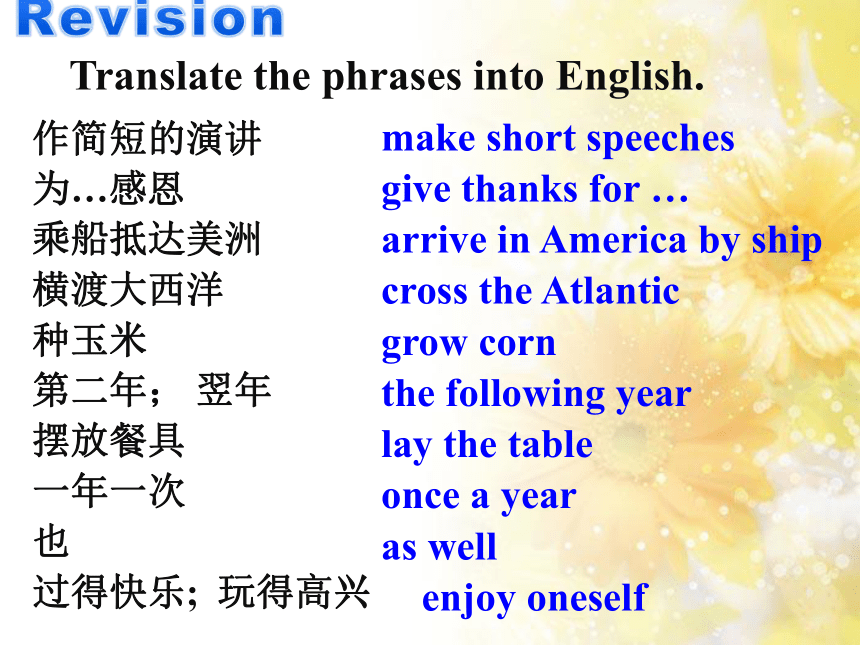
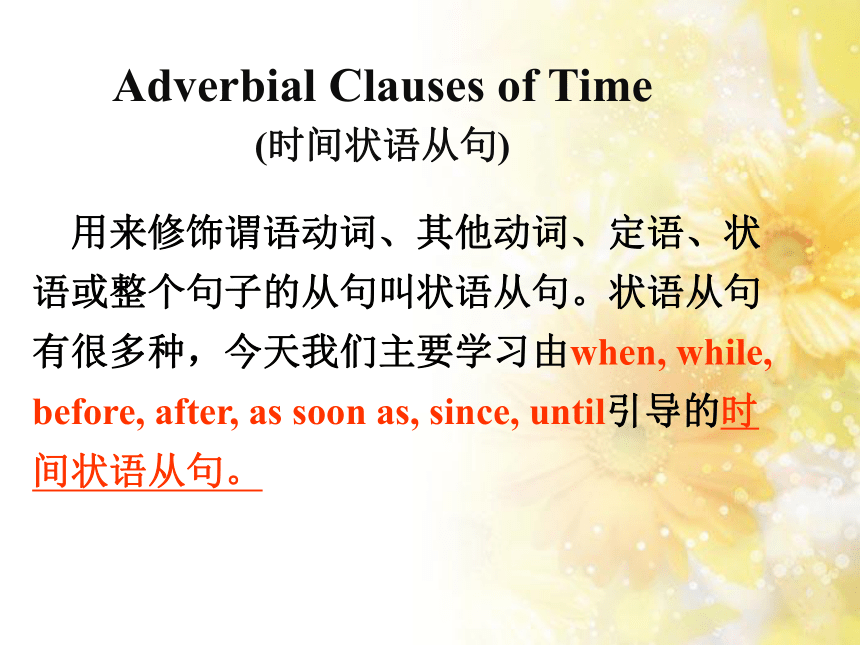
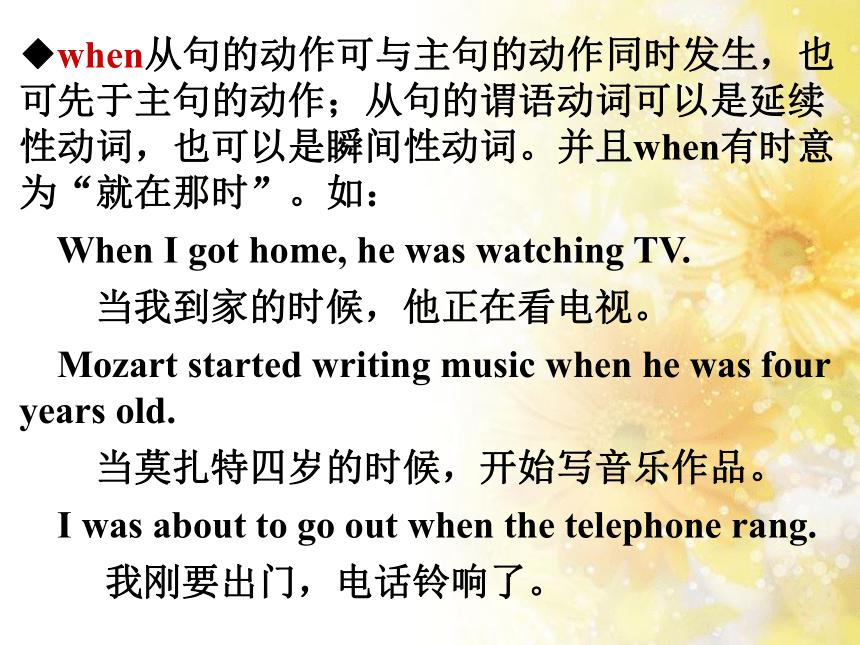
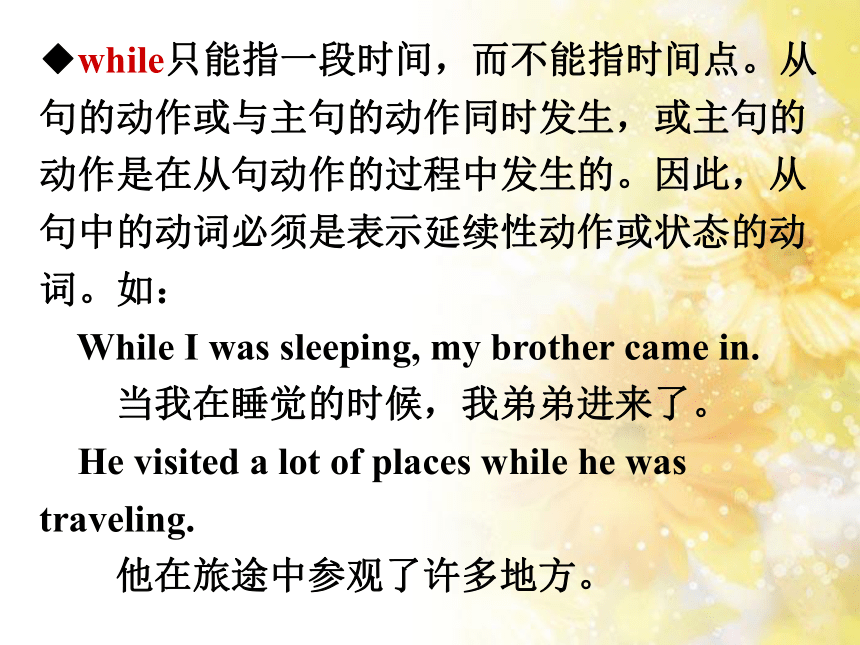
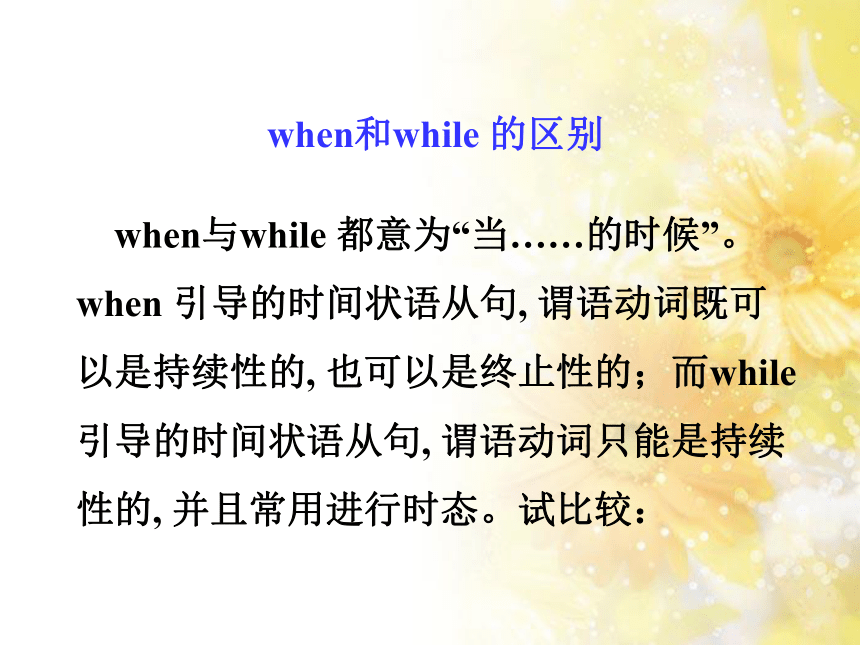
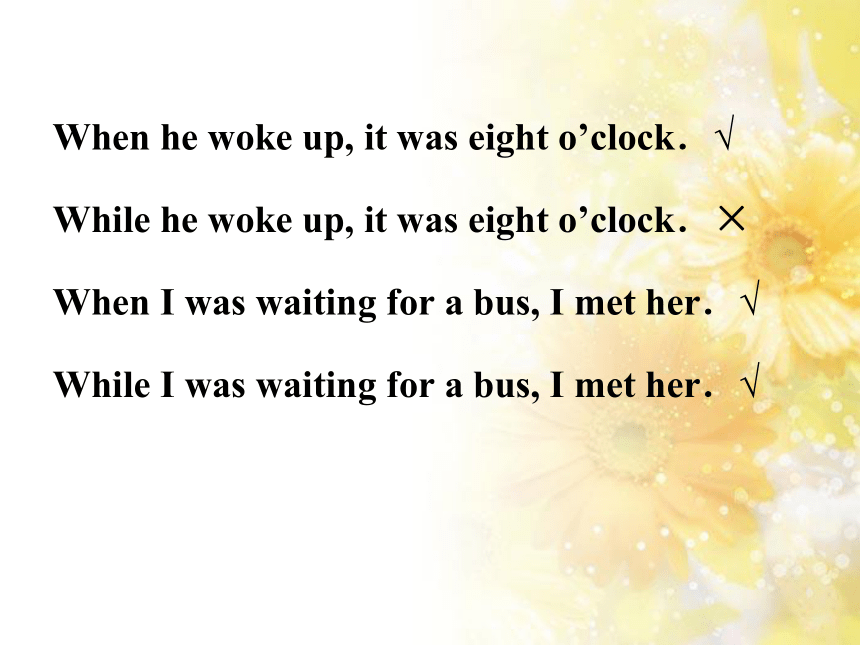
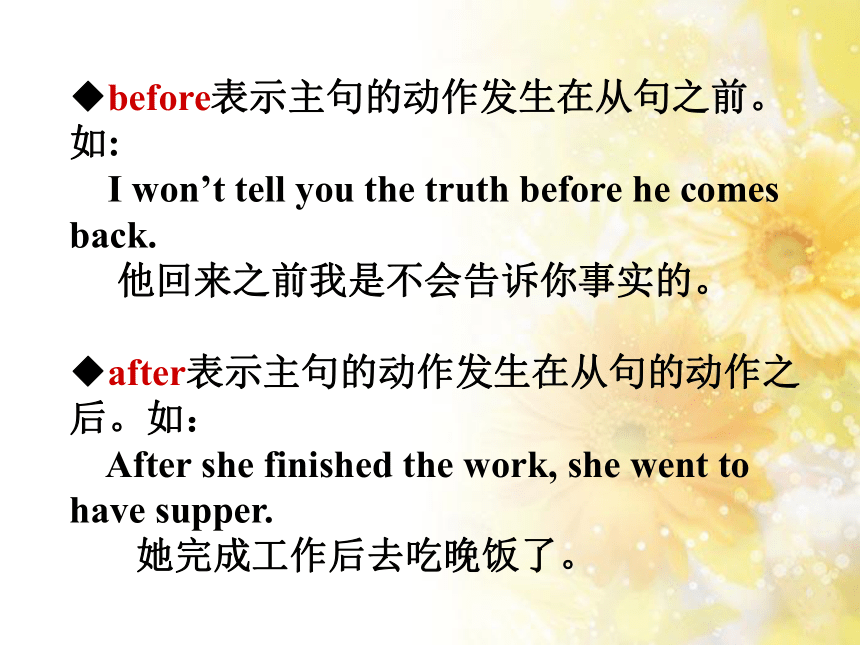
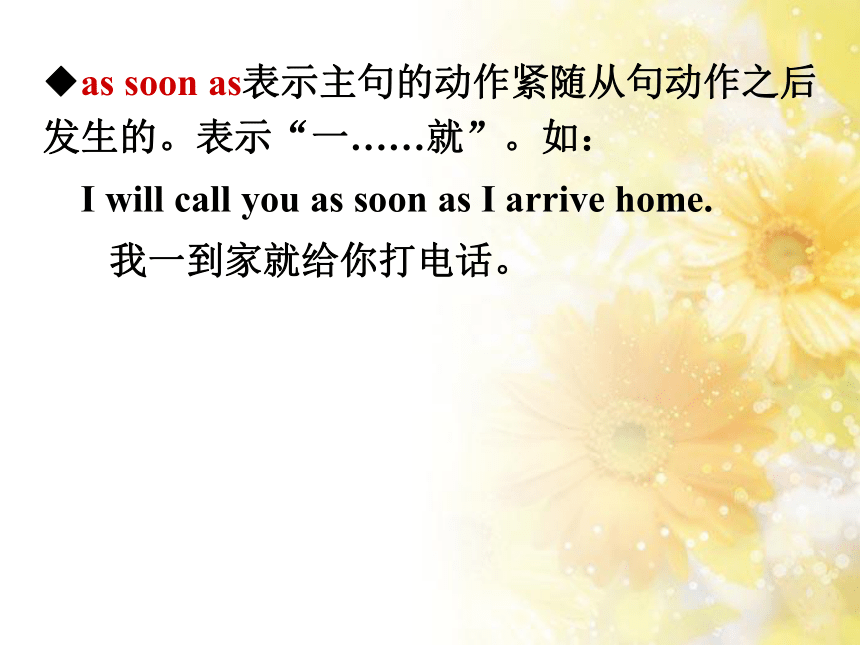
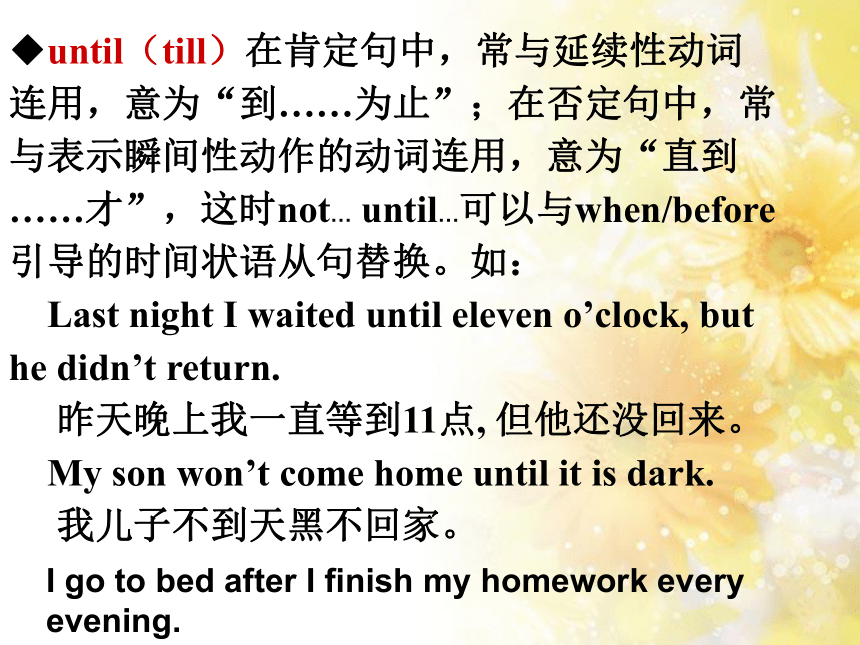
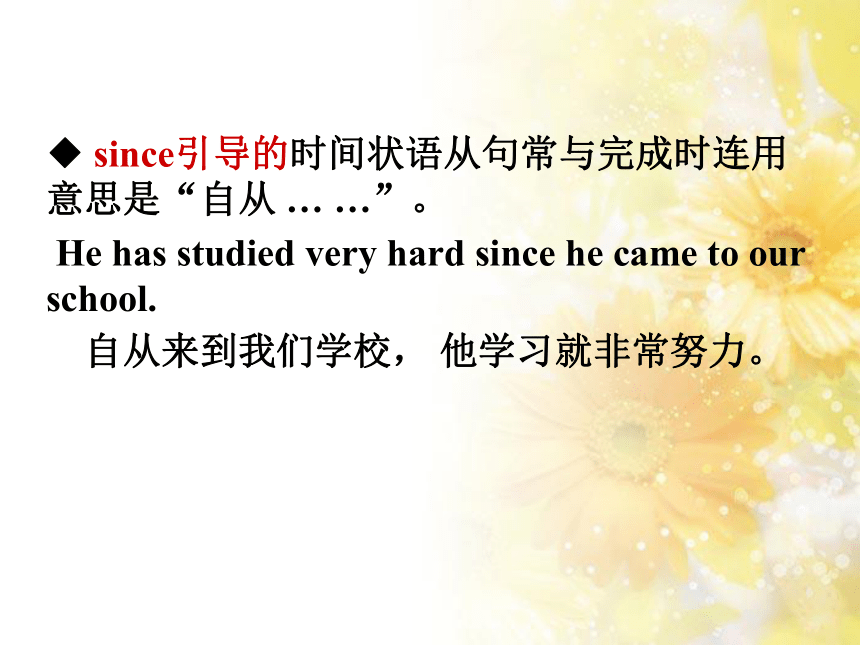
文档简介
(共30张PPT)
Unit 3
a public holiday
take a vacation
since then
have a three-day
holiday
have one day off
all kinds of
a national holiday
anything special
公休日
休假
从那以后
有三天的假期
休一天假
各种各样的
全国性的节日
任何特殊的事情
Translate the phrases into English.
make short speeches
give thanks for …
arrive in America by ship
cross the Atlantic
grow corn
the following year
lay the table
once a year
as well
enjoy oneself
作简短的演讲
为…感恩
乘船抵达美洲
横渡大西洋
种玉米
第二年; 翌年
摆放餐具
一年一次
也
过得快乐; 玩得高兴
Translate the phrases into English.
Adverbial Clauses of Time
(时间状语从句)
用来修饰谓语动词、其他动词、定语、状语或整个句子的从句叫状语从句。状语从句有很多种,今天我们主要学习由when, while, before, after, as soon as, since, until引导的时间状语从句。
◆when从句的动作可与主句的动作同时发生,也可先于主句的动作;从句的谓语动词可以是延续性动词,也可以是瞬间性动词。并且when有时意为“就在那时”。如:
When I got home, he was watching TV.
当我到家的时候,他正在看电视。
Mozart started writing music when he was four years old.
当莫扎特四岁的时候,开始写音乐作品。
I was about to go out when the telephone rang.
我刚要出门,电话铃响了。
◆while只能指一段时间,而不能指时间点。从句的动作或与主句的动作同时发生,或主句的动作是在从句动作的过程中发生的。因此,从句中的动词必须是表示延续性动作或状态的动词。如:
While I was sleeping, my brother came in.
当我在睡觉的时候,我弟弟进来了。
He visited a lot of places while he was traveling.
他在旅途中参观了许多地方。
when和while 的区别
when与while 都意为“当……的时候”。when 引导的时间状语从句, 谓语动词既可以是持续性的, 也可以是终止性的;而while引导的时间状语从句, 谓语动词只能是持续性的, 并且常用进行时态。试比较:
When he woke up, it was eight o’clock.√ While he woke up, it was eight o’clock.× When I was waiting for a bus, I met her.√
While I was waiting for a bus, I met her.√
◆before表示主句的动作发生在从句之前。如:
I won’t tell you the truth before he comes back.
他回来之前我是不会告诉你事实的。
◆after表示主句的动作发生在从句的动作之后。如:
After she finished the work, she went to have supper.
她完成工作后去吃晚饭了。
◆as soon as表示主句的动作紧随从句动作之后发生的。表示“一……就”。如:
I will call you as soon as I arrive home.
我一到家就给你打电话。
◆until(till)在肯定句中,常与延续性动词连用,意为“到……为止”;在否定句中,常与表示瞬间性动作的动词连用,意为“直到……才”,这时not… until…可以与when/before引导的时间状语从句替换。如:
Last night I waited until eleven o’clock, but he didn’t return.
昨天晚上我一直等到11点, 但他还没回来。
My son won’t come home until it is dark.
我儿子不到天黑不回家。
I go to bed after I finish my homework every evening.
◆ since引导的时间状语从句常与完成时连用 意思是“自从 … …”。
He has studied very hard since he came to our school.
自从来到我们学校, 他学习就非常努力。
Complete the sentences.
_________ our friends arrived, we all went to the square.
2. _______ they were watching TV, we listened to music and sang traditional songs.
3. __________ it was twelve o’clock, we all shouted “Happy New Year”.
4. We stayed there _________ she arrived.
5. He has made much progress __________ he started to learn English last month.
While
As soon as
until
since
after as soon as since until while
After/
As soon as
Fill in the blanks using the words in the box.
_____ we’re staying with them, we’re going to spend a few days in Qingdao.
2. It’s the last day ______ the new school year begins.
3. _______ September comes, it starts to get cooler.
4. We also go back to school ________ the May Day holiday is over.
5. We only have a few weeks ________ the start of the summer holidays.
While
before
When
as soon as
before
when, while, until, before, as soon as, after
6. Let’s enjoy ourselves ______ we go back to
school. 7. __________ it’s 12 o’clock, everyone shouts
very loudly. 8. ______ the weather is fine, many families go
out for a walk. 9. ______ they’re waiting for the New Year,
they listen to music, sing traditional songs
and have fun. 10. What are you going to do _____ you finish
college
before
As soon as
When
While
after
1. You finish writing the report. You can read it to us. (as soon as)
__________________________________________________________________________
2. He had lunch. He started to do his job. (after)
__________________________________________________________________________
Rewrite these sentences.
As soon as you finish writing the report, you can read it to us.
After he had lunch, he started to do his job.
3. He didn’t go home. He finished cleaning the classroom. (until)
________________________________________________________________________________
4. Mr Liu was singing. Miss Wang was dancing. (while)
________________________________________________________________________________
5. The boy felt nervous. The teacher asked him. (before)
________________________________________________________________________________
He didn’t go home until he finished cleaning the classroom.
The boy felt nervous before the teacher asked him.
Mr Liu was singing while Miss Wang was dancing.
1. 我一看到奶奶,就感到很高兴。
__________ I see my grandmother, I feel very happy.
2.当天黑时,有烟花。
________ it gets dark, there are fireworks.
3.直到我回家,我妈妈才睡觉。
My mother didn’t go to sleep______ I got back home.
Translate the sentences.
As soon as
When
until
1. When September comes, it starts to get cooler.
当九月来临的时候,天气就转凉。
2. We also go back to school as soon as the May Day holiday is over.
我们也是五一节一结束就回去上学。
3. While we’re staying with them, we’re going to spend a few days in Qingdao.
当我们跟他们在一起的时候,我们将去青岛待几天。
Translate these sentences.
4. We only have a few weeks before the start of the summer holiday.
在暑假开始之前,我们只有几个星期。
5. Let’s enjoy ourselves until we go back to school.
让我们痛痛快快地玩直到返校。
after the food has all gone
b) as soon as you’re ready
c) before there are too many people
d) before we go
e) when we get back
f) while we’re waiting for the New Year
Complete the conversation with the expressions in the box.
B: When are we going to the party D: We’re waiting for you. We can go ______. B: OK, let’s go. It’s better to be early and get
there ________. D: Yes, we don’t want to get there _______. B: Oh, Daming! You always think about
eating. D: Well, it’s something to do _________. B: Don’t you want to make a plan for the New
Year ________ D: No, it’s OK. I’ll make it _____.
b
c
a
f
D = Daming B = Betty
d
e
1. I’ll go to visit my aunt in England _____ the summer holidays start.
A. while B. since C. until D. as soon as
2. Linda was just going out for shopping ______ the telephone rang.
A. while B. when C. after D. because
D
B
3. When you ______ at a restaurant, please order just enough food.
A. ate B. will eat C. eat D. haven eaten
4. The bus driver always says to us, “Don’t get off _______ the bus stops.”
A. when B. while C .until D. if
5. What ______ you _____ when the captain came in
A. are; doing B. did; do
C. were; doing
C
C
C
6. Henry will give us a report as soon as he _______.
A. arrives B. arrived
C. is arriving D. will arrive
7. When Jim’s mother came in, he ______ his homework.
A. is doing B. has done C. was doing
8. _______ I got back, I found my mother cooking for me.
A. When B. Before C. Since D. Although
A
C
A
接龙
幻灯片上单词或短语出现时,同学应迅速读出并说出中文意思。
每人一词,按行/列依次接龙,3秒内说不出,此行/列同学即失去此答题机会,下一行/列同学接续。
until
off
seventh
grow
following
over
corn
all kinds of
season
lay
lay the table
pioneer
since then
speech
as soon as
have fun
found
parade
1. While we are staying with our friends, we are
going to spend a few days in Qingdao.
2. It’s the last day before the new school year
begins.
3. When September comes, it starts to get cooler.
4. We also go back to school as soon as the May
Day holiday is over.
5. Let us enjoy ourselves until we go back to
school.
6. We have celebrated the festival since the first
pioneers from England arrived in America.
Read and find.
1. When September comes, it starts to get cooler.
当…的时候
2. We also go back to school as soon as the May
Day holiday is over.
一…就…
3. While we’re staying with them, we’re going to
spend a few days in Qingdao.
当…的时候
4. We only have a few weeks before the start of
the summer holiday.
在…之前
5. Let’s enjoy ourselves until we go back to school.
直到…
6. She's changed much since she got that job.
自从
1. We went skating in the afternoon before/when the party started. 2. Until/After dinner, we joined a group of friends and we all went to the square. 3. While/When they were watching TV, we listened to music and sang traditional songs. 4. As soon as/ After it was 12 o’clock, we all shouted “Happy New Year” very loudly. 5. We stay in the square after/until one o’clock. 6. While /When the party was over, we walked back to our hotel.
Choose the correct word to complete the sentences.
Unit 3
a public holiday
take a vacation
since then
have a three-day
holiday
have one day off
all kinds of
a national holiday
anything special
公休日
休假
从那以后
有三天的假期
休一天假
各种各样的
全国性的节日
任何特殊的事情
Translate the phrases into English.
make short speeches
give thanks for …
arrive in America by ship
cross the Atlantic
grow corn
the following year
lay the table
once a year
as well
enjoy oneself
作简短的演讲
为…感恩
乘船抵达美洲
横渡大西洋
种玉米
第二年; 翌年
摆放餐具
一年一次
也
过得快乐; 玩得高兴
Translate the phrases into English.
Adverbial Clauses of Time
(时间状语从句)
用来修饰谓语动词、其他动词、定语、状语或整个句子的从句叫状语从句。状语从句有很多种,今天我们主要学习由when, while, before, after, as soon as, since, until引导的时间状语从句。
◆when从句的动作可与主句的动作同时发生,也可先于主句的动作;从句的谓语动词可以是延续性动词,也可以是瞬间性动词。并且when有时意为“就在那时”。如:
When I got home, he was watching TV.
当我到家的时候,他正在看电视。
Mozart started writing music when he was four years old.
当莫扎特四岁的时候,开始写音乐作品。
I was about to go out when the telephone rang.
我刚要出门,电话铃响了。
◆while只能指一段时间,而不能指时间点。从句的动作或与主句的动作同时发生,或主句的动作是在从句动作的过程中发生的。因此,从句中的动词必须是表示延续性动作或状态的动词。如:
While I was sleeping, my brother came in.
当我在睡觉的时候,我弟弟进来了。
He visited a lot of places while he was traveling.
他在旅途中参观了许多地方。
when和while 的区别
when与while 都意为“当……的时候”。when 引导的时间状语从句, 谓语动词既可以是持续性的, 也可以是终止性的;而while引导的时间状语从句, 谓语动词只能是持续性的, 并且常用进行时态。试比较:
When he woke up, it was eight o’clock.√ While he woke up, it was eight o’clock.× When I was waiting for a bus, I met her.√
While I was waiting for a bus, I met her.√
◆before表示主句的动作发生在从句之前。如:
I won’t tell you the truth before he comes back.
他回来之前我是不会告诉你事实的。
◆after表示主句的动作发生在从句的动作之后。如:
After she finished the work, she went to have supper.
她完成工作后去吃晚饭了。
◆as soon as表示主句的动作紧随从句动作之后发生的。表示“一……就”。如:
I will call you as soon as I arrive home.
我一到家就给你打电话。
◆until(till)在肯定句中,常与延续性动词连用,意为“到……为止”;在否定句中,常与表示瞬间性动作的动词连用,意为“直到……才”,这时not… until…可以与when/before引导的时间状语从句替换。如:
Last night I waited until eleven o’clock, but he didn’t return.
昨天晚上我一直等到11点, 但他还没回来。
My son won’t come home until it is dark.
我儿子不到天黑不回家。
I go to bed after I finish my homework every evening.
◆ since引导的时间状语从句常与完成时连用 意思是“自从 … …”。
He has studied very hard since he came to our school.
自从来到我们学校, 他学习就非常努力。
Complete the sentences.
_________ our friends arrived, we all went to the square.
2. _______ they were watching TV, we listened to music and sang traditional songs.
3. __________ it was twelve o’clock, we all shouted “Happy New Year”.
4. We stayed there _________ she arrived.
5. He has made much progress __________ he started to learn English last month.
While
As soon as
until
since
after as soon as since until while
After/
As soon as
Fill in the blanks using the words in the box.
_____ we’re staying with them, we’re going to spend a few days in Qingdao.
2. It’s the last day ______ the new school year begins.
3. _______ September comes, it starts to get cooler.
4. We also go back to school ________ the May Day holiday is over.
5. We only have a few weeks ________ the start of the summer holidays.
While
before
When
as soon as
before
when, while, until, before, as soon as, after
6. Let’s enjoy ourselves ______ we go back to
school. 7. __________ it’s 12 o’clock, everyone shouts
very loudly. 8. ______ the weather is fine, many families go
out for a walk. 9. ______ they’re waiting for the New Year,
they listen to music, sing traditional songs
and have fun. 10. What are you going to do _____ you finish
college
before
As soon as
When
While
after
1. You finish writing the report. You can read it to us. (as soon as)
__________________________________________________________________________
2. He had lunch. He started to do his job. (after)
__________________________________________________________________________
Rewrite these sentences.
As soon as you finish writing the report, you can read it to us.
After he had lunch, he started to do his job.
3. He didn’t go home. He finished cleaning the classroom. (until)
________________________________________________________________________________
4. Mr Liu was singing. Miss Wang was dancing. (while)
________________________________________________________________________________
5. The boy felt nervous. The teacher asked him. (before)
________________________________________________________________________________
He didn’t go home until he finished cleaning the classroom.
The boy felt nervous before the teacher asked him.
Mr Liu was singing while Miss Wang was dancing.
1. 我一看到奶奶,就感到很高兴。
__________ I see my grandmother, I feel very happy.
2.当天黑时,有烟花。
________ it gets dark, there are fireworks.
3.直到我回家,我妈妈才睡觉。
My mother didn’t go to sleep______ I got back home.
Translate the sentences.
As soon as
When
until
1. When September comes, it starts to get cooler.
当九月来临的时候,天气就转凉。
2. We also go back to school as soon as the May Day holiday is over.
我们也是五一节一结束就回去上学。
3. While we’re staying with them, we’re going to spend a few days in Qingdao.
当我们跟他们在一起的时候,我们将去青岛待几天。
Translate these sentences.
4. We only have a few weeks before the start of the summer holiday.
在暑假开始之前,我们只有几个星期。
5. Let’s enjoy ourselves until we go back to school.
让我们痛痛快快地玩直到返校。
after the food has all gone
b) as soon as you’re ready
c) before there are too many people
d) before we go
e) when we get back
f) while we’re waiting for the New Year
Complete the conversation with the expressions in the box.
B: When are we going to the party D: We’re waiting for you. We can go ______. B: OK, let’s go. It’s better to be early and get
there ________. D: Yes, we don’t want to get there _______. B: Oh, Daming! You always think about
eating. D: Well, it’s something to do _________. B: Don’t you want to make a plan for the New
Year ________ D: No, it’s OK. I’ll make it _____.
b
c
a
f
D = Daming B = Betty
d
e
1. I’ll go to visit my aunt in England _____ the summer holidays start.
A. while B. since C. until D. as soon as
2. Linda was just going out for shopping ______ the telephone rang.
A. while B. when C. after D. because
D
B
3. When you ______ at a restaurant, please order just enough food.
A. ate B. will eat C. eat D. haven eaten
4. The bus driver always says to us, “Don’t get off _______ the bus stops.”
A. when B. while C .until D. if
5. What ______ you _____ when the captain came in
A. are; doing B. did; do
C. were; doing
C
C
C
6. Henry will give us a report as soon as he _______.
A. arrives B. arrived
C. is arriving D. will arrive
7. When Jim’s mother came in, he ______ his homework.
A. is doing B. has done C. was doing
8. _______ I got back, I found my mother cooking for me.
A. When B. Before C. Since D. Although
A
C
A
接龙
幻灯片上单词或短语出现时,同学应迅速读出并说出中文意思。
每人一词,按行/列依次接龙,3秒内说不出,此行/列同学即失去此答题机会,下一行/列同学接续。
until
off
seventh
grow
following
over
corn
all kinds of
season
lay
lay the table
pioneer
since then
speech
as soon as
have fun
found
parade
1. While we are staying with our friends, we are
going to spend a few days in Qingdao.
2. It’s the last day before the new school year
begins.
3. When September comes, it starts to get cooler.
4. We also go back to school as soon as the May
Day holiday is over.
5. Let us enjoy ourselves until we go back to
school.
6. We have celebrated the festival since the first
pioneers from England arrived in America.
Read and find.
1. When September comes, it starts to get cooler.
当…的时候
2. We also go back to school as soon as the May
Day holiday is over.
一…就…
3. While we’re staying with them, we’re going to
spend a few days in Qingdao.
当…的时候
4. We only have a few weeks before the start of
the summer holiday.
在…之前
5. Let’s enjoy ourselves until we go back to school.
直到…
6. She's changed much since she got that job.
自从
1. We went skating in the afternoon before/when the party started. 2. Until/After dinner, we joined a group of friends and we all went to the square. 3. While/When they were watching TV, we listened to music and sang traditional songs. 4. As soon as/ After it was 12 o’clock, we all shouted “Happy New Year” very loudly. 5. We stay in the square after/until one o’clock. 6. While /When the party was over, we walked back to our hotel.
Choose the correct word to complete the sentences.
同课章节目录
- Module 1 Wonders of the world
- Unit 1 It's more than 2,000 years old.
- Unit 2 The Grand Canyon was not just big.
- Unit 3 Language in use
- Module 2 Public holidays
- Unit 1 My family always go somewhere interesting a
- Unit 2 We have celebrated the festival since the f
- Unit 3 Language in use
- Module 3 Heroes
- Unit 1 She trained hard,so she became a great play
- Unit 2There were few doctors, so he had to work ve
- Unit 3 Language in use
- Module 4 Home alone
- Unit 1 I can look after myself, although it won’t
- Unit 2 I became so bored with their orders that I
- Unit 3 Language in use
- Module 5 Museums
- Unit 1 Don't cross that rope!
- Unit 2 If you ever go to London, make sure you vis
- Unit 3 Language in use
- Module 6 Problems
- Unit 1 If I start after dinner, I'll finish it be
- Unit 2 If you tell him the truth now, you will sho
- Unit 3 Language in use
- Revision Module A
- Module 7 Great books
- Unit 1 We're still influenced by Confucius's idea
- Unit 2 It is still read and loved.
- Unit 3 Language in use
- Module 8 Sports life
- Unit 1 Daming wasn't chosen for the team last time
- Unit 2 He was invited to competitions around the w
- Unit 3 Language in use
- Module 9 Great inventions
- Unit 1 Will computers be used more than books in t
- Unit 2 Will books be replaced by the Internet?
- Unit 3 Language in use
- Module 10 Australia
- Unit 1 I have some photos that I took in Australia
- Unit 2 The game that they like most is Australian
- Unit 3 Language in use
- Module 11 Photos
- Unit 1 He's the boy who won the photo competition
- Unit 2 The photo which we liked best was taken by
- Unit 3 Language in use
- Module 12 Save our world
- Unit 1 If everyone starts to do something, the wor
- Unit 2 Repeat these three words daily: reduce, reu
- Unit 3 Language in use
- Revision Module B
